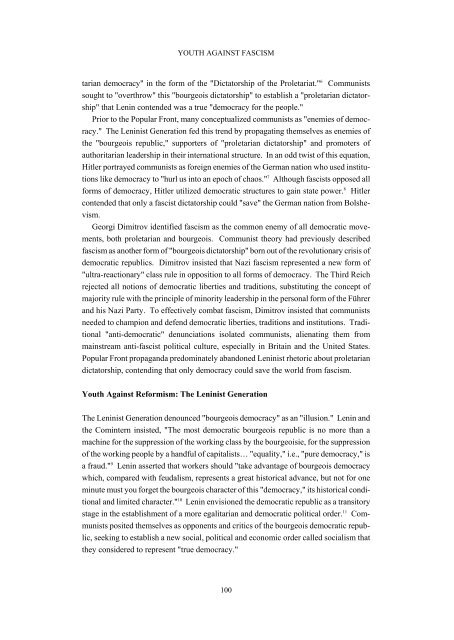Joel A Lewis Youth Against Fascism.pdf
Joel A Lewis Youth Against Fascism.pdf
Joel A Lewis Youth Against Fascism.pdf
You also want an ePaper? Increase the reach of your titles
YUMPU automatically turns print PDFs into web optimized ePapers that Google loves.
YOUTH AGAINST FASCISM<br />
tarian democracy" in the form of the "Dictatorship of the Proletariat." 6 Communists<br />
sought to "overthrow" this "bourgeois dictatorship" to establish a "proletarian dictatorship"<br />
that Lenin contended was a true "democracy for the people."<br />
Prior to the Popular Front, many conceptualized communists as "enemies of democracy."<br />
The Leninist Generation fed this trend by propagating themselves as enemies of<br />
the "bourgeois republic," supporters of "proletarian dictatorship" and promoters of<br />
authoritarian leadership in their international structure. In an odd twist of this equation,<br />
Hitler portrayed communists as foreign enemies of the German nation who used institutions<br />
like democracy to "hurl us into an epoch of chaos." 7 Although fascists opposed all<br />
forms of democracy, Hitler utilized democratic structures to gain state power. 8 Hitler<br />
contended that only a fascist dictatorship could "save" the German nation from Bolshevism.<br />
Georgi Dimitrov identified fascism as the common enemy of all democratic movements,<br />
both proletarian and bourgeois. Communist theory had previously described<br />
fascism as another form of "bourgeois dictatorship" born out of the revolutionary crisis of<br />
democratic republics. Dimitrov insisted that Nazi fascism represented a new form of<br />
"ultra-reactionary" class rule in opposition to all forms of democracy. The Third Reich<br />
rejected all notions of democratic liberties and traditions, substituting the concept of<br />
majority rule with the principle of minority leadership in the personal form of the Führer<br />
and his Nazi Party. To effectively combat fascism, Dimitrov insisted that communists<br />
needed to champion and defend democratic liberties, traditions and institutions. Traditional<br />
"anti-democratic" denunciations isolated communists, alienating them from<br />
mainstream anti-fascist political culture, especially in Britain and the United States.<br />
Popular Front propaganda predominately abandoned Leninist rhetoric about proletarian<br />
dictatorship, contending that only democracy could save the world from fascism.<br />
<strong>Youth</strong> <strong>Against</strong> Reformism: The Leninist Generation<br />
The Leninist Generation denounced "bourgeois democracy" as an "illusion." Lenin and<br />
the Comintern insisted, "The most democratic bourgeois republic is no more than a<br />
machine for the suppression of the working class by the bourgeoisie, for the suppression<br />
of the working people by a handful of capitalists… "equality," i.e., "pure democracy," is<br />
a fraud." 9 Lenin asserted that workers should "take advantage of bourgeois democracy<br />
which, compared with feudalism, represents a great historical advance, but not for one<br />
minute must you forget the bourgeois character of this "democracy," its historical conditional<br />
and limited character." 10 Lenin envisioned the democratic republic as a transitory<br />
stage in the establishment of a more egalitarian and democratic political order. 11 Communists<br />
posited themselves as opponents and critics of the bourgeois democratic republic,<br />
seeking to establish a new social, political and economic order called socialism that<br />
they considered to represent "true democracy."<br />
100

















